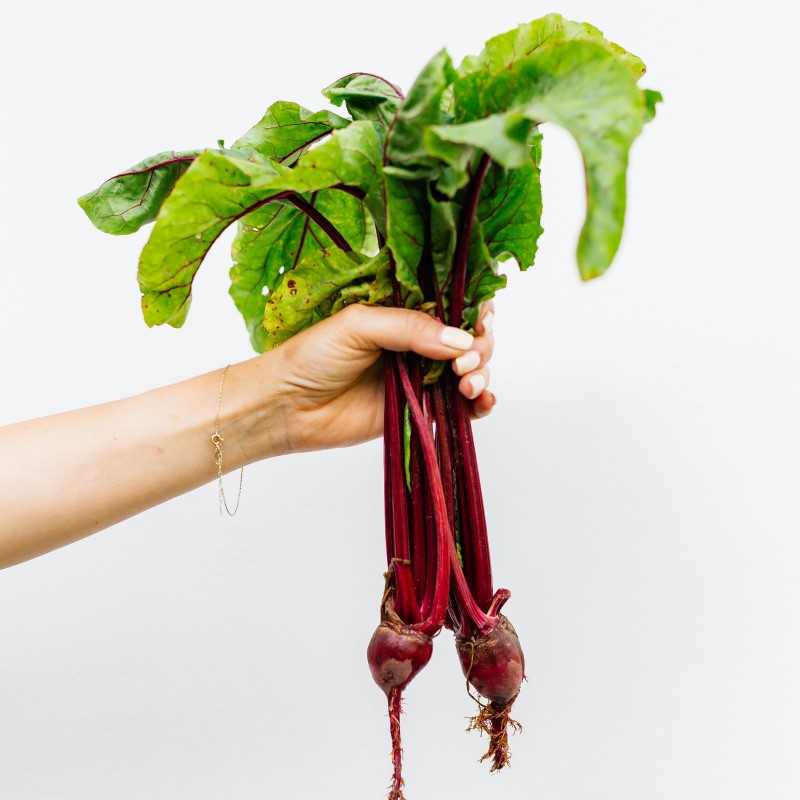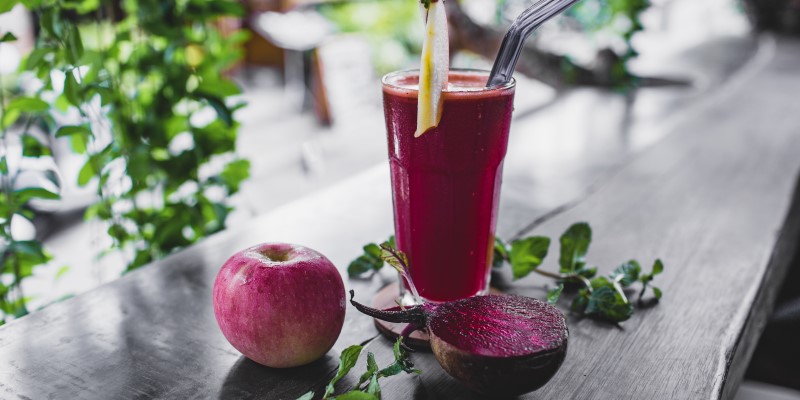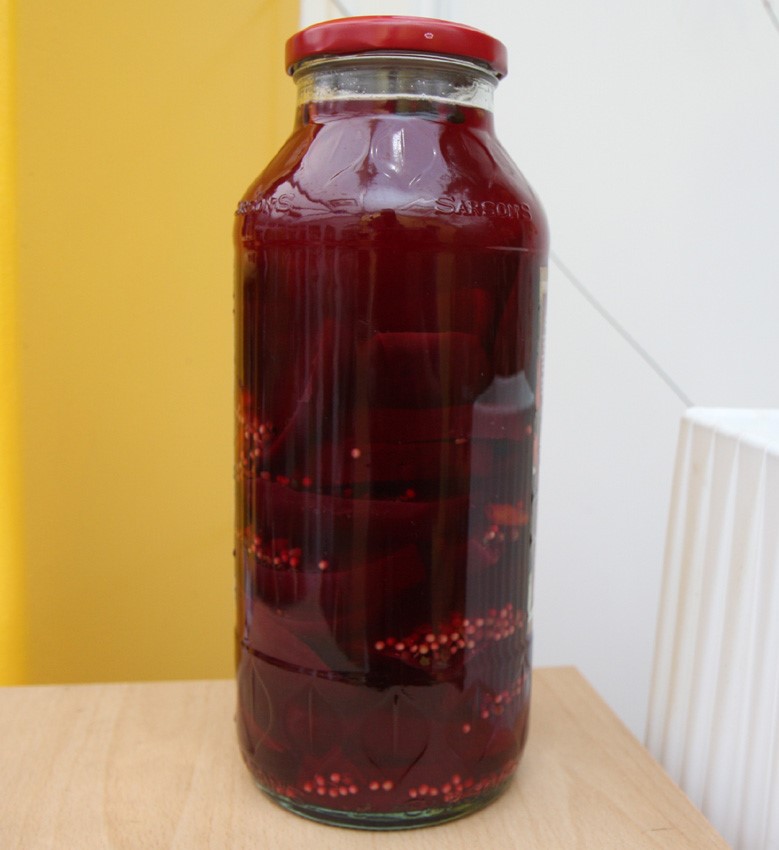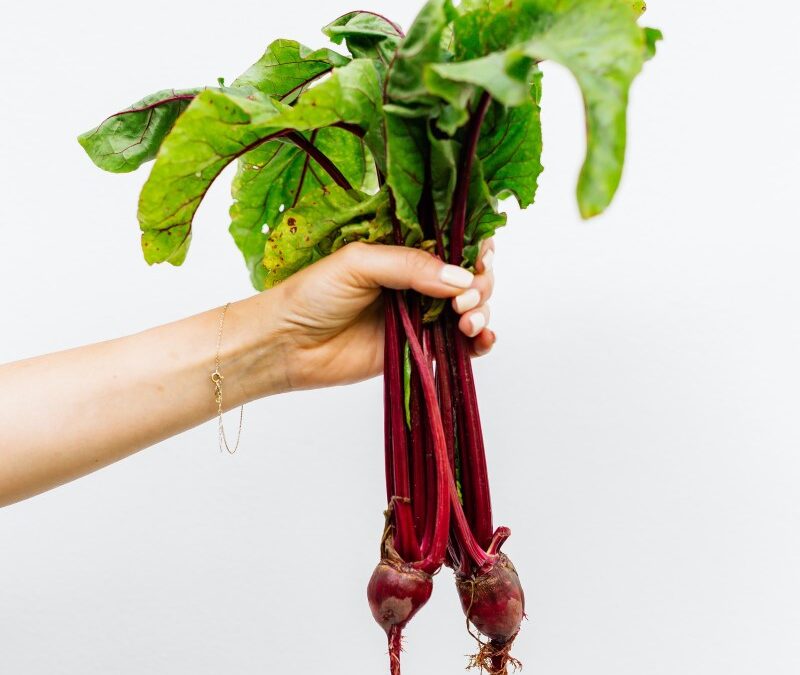Looking to boost your health and well-being? Look no further than beetroot, a powerhouse superfood chock-full of essential vitamins and minerals. With its high fibre content, beetroot aids in weight management by promoting satiety and supporting healthy digestion. Its benefits extend beyond the waistline, improving heart and brain function and skin health.
In this quick guide, we’ll explore the origins of beetroot, its many health benefits, discuss its vitamins and minerals, and provide delicious beetroot recipes to incorporate into your diet. Get ready to unlock the incredible potential of this versatile vegetable!
Key Takeaways
- Beetroot is nutrient-dense, high in vitamins A, C, and K, and minerals like potassium, manganese, and iron.
- It is low in calories and fat, making it an excellent choice for weight management and supporting healthy weight loss.
- Beetroot promotes heart health by reducing blood pressure, improving blood flow, and maintaining healthy cholesterol levels.
- It has anti-inflammatory properties, supports immune function, aids digestion, and helps cleanse the body, making it versatile for overall health and well-being.
Table of Contents
The Origins of Beetroot
Beetroot, enjoyed for its numerous health benefits, originated in the Mediterranean region and has been cultivated for thousands of years. This vibrant root vegetable is delicious and packed with nutrients that support your overall well-being. Beetroot contains high levels of vitamins, minerals, and antioxidants that promote good health. It is an excellent source of dietary fibre, which aids in digestion and helps prevent constipation.
Additionally, beetroot contains betaine, which reduces inflammation and supports optimal immune function. This versatile vegetable can also improve blood flow to the brain, enhancing cognitive function and memory. With its anti-aging properties and potential cancer-fighting abilities, beetroot truly earns its reputation as a superfood. Incorporating this nutritious root vegetable into your diet can promote a healthier lifestyle.
Health Benefits of Beetroot
Beetroot offers a range of health benefits that can support your brain function and detoxification processes. It contains nitrates that improve blood flow to the brain, enhancing cognitive function and memory. Additionally, beetroot is rich in antioxidants that help eliminate toxins, support liver function, and aid in overall body cleansing.
Brain Function and Detoxification
Improving brain function and supporting detoxification processes, beetroot contains nitrates that enhance blood flow to the brain. This means consuming beetroot or its juice can positively impact your cognitive abilities and memory. Additionally, beetroot’s antioxidants help eliminate toxins from the body, supporting overall brain health. To reap these benefits, consider incorporating more beetroot into your diet. Here are some practical ways to do so:
- Enjoy a glass of refreshing beetroot juice in the morning to start your day with a brain-boosting dose of nitrates.
- Experiment with delicious beetroot recipes like roasted beet salad or beet chips for a tasty way to incorporate this superfood into your meals.
- Ensure you’re getting enough folate by including beetroots in your diet, as they are an excellent source of this essential nutrient.
- Combine beetroot with other antioxidant-rich foods like berries and leafy greens to create a powerful detoxifying meal.
Adding more beetroot to your diet can support optimal brain function and aid the body’s natural detoxification process while enjoying delicious and nutritious meals.

Immune-Boosting Properties
Boost your immune system by incorporating beetroot into your diet and take advantage of its immune-boosting properties. Beetroot is a superfood that offers many health benefits, including its ability to support optimal immune function. This vibrant veggie contains nutrients like vitamins A and C, which are essential for a strong immune system.
Beetroot also contains antioxidants that help reduce oxidative stress in the body, protecting against cellular damage and supporting overall immune health. Additionally, beetroot’s high fibre content promotes a healthy gut microbiome, which is crucial to immune function. Adding beetroot to your meals or enjoying it as a juice can provide immune-boosting benefits and help keep you healthy year-round.
Beetroot for Heart Health
Incorporating beetroot into your diet can support heart health due to its ability to lower blood pressure and improve circulation. Beetroot contains nitrates, which are converted into nitric oxide in the body. Nitric oxide helps relax and dilate blood vessels, improving blood flow and reducing blood pressure. Additionally, beetroot is rich in vitamins and minerals like potassium, which play a key role in maintaining healthy blood pressure levels.
To further highlight the benefits of beetroot for heart health, take a look at this table:
| Key Nutrients | Benefits |
|---|---|
| Potassium | Supports healthy blood pressure |
| Vitamin C | Reduces risk of heart disease |
| Iron | Supports overall heart function |
| Betaine | Reduces inflammation |
Whether you include beetroot in your meals or enjoy it as a refreshing juice, you can harness its natural properties to promote optimal heart health.
Digestive Health
To support your digestive health, consider including beetroot in your diet, as it is high in fibre and aids digestion. The high fibre content of beetroot promotes regular bowel movements and helps prevent constipation. It also supports a healthy gut microbiome essential for optimal digestion. Adding beetroot to your salads or incorporating it into your meals can provide the necessary fibre to keep your digestive system functioning smoothly.
Fibre-rich foods like beetroot help regulate food movement through the digestive tract, eliminating waste efficiently. Additionally, beetroot may reduce the risk of colon cancer due to its high fibre content and potential anti-cancer properties. So, to improve your digestion and maintain a healthy bowel function, include this vibrant veggie in your diet.
Side-effects of Beetroot
While beetroot is generally safe to consume, it may cause temporary discolouration of urine and stools. This is a harmless side effect known as beeturia and occurs due to the presence of pigments called betalains in beetroot. The discolouration is usually red or pink in colour and may last for a few hours or up to a couple of days. It is important to note that beeturia does not indicate any underlying health issues.
If you are concerned about this side effect, you can try cooking or processing the beetroot before consuming it, as this can reduce the likelihood of beeturia occurring. Additionally, drinking plenty of water can help dilute the pigment and minimize its effects.
It’s worth mentioning that high nitrate content in beetroot juice may interact with certain medications and increase blood pressure in some individuals. If you have high blood pressure or are taking medication for it, it’s best to consult your healthcare provider before incorporating large amounts of beet juice into your diet.
Vitamins and Minerals in Beetroot
Beetroot contains vitamins A, C, and K and minerals like potassium, manganese, and iron. These nutrients play a vital role in maintaining overall health and well-being. Here are three key benefits of these vitamins and minerals found in beetroot:
- Vitamin A: Important for maintaining healthy skin. It helps prevent upper respiratory tract infections, such as colds and sore throats.
- Vitamin C: Beetroot is an excellent vitamin C source, and a powerful antioxidant. It helps boost the immune system, supports collagen production for healthy skin, and aids in wound healing.
- Potassium: Crucial in regulating blood pressure levels and promoting proper heart function. Consuming beetroot can help maintain healthy blood pressure levels and improve blood flow.
Incorporating beetroot into your diet can provide you with these essential vitamins and minerals that contribute to overall health and well-being.
Beetroot Recipes
If you want to incorporate more beetroot into your diet, there are plenty of delicious and nutritious ways. Beetroot salads are an excellent option for a refreshing and filling meal packed with vitamins, minerals, and dietary fibre. You can also try making beetroot juice recipes for a quick and easy way to reap the benefits of this superfood. And if you’re in the mood for something warm and comforting, beetroot soups are an excellent choice that tastes great and provides numerous health benefits.
Here is a table highlighting some common ways people consume beetroot:
| Beetroot Preparation | Description |
|---|---|
| Beetroot Salad | Raw or cooked beetroot sliced or grated and mixed with other vegetables for a refreshing salad. |
| Beet Juice | Freshly squeezed juice from raw beets, often combined with other fruits or vegetables. |
| Pickled Beets | Beetroots preserved in vinegar solution, commonly used as a condiment or added to sandwiches. |
Beetroot Salads
One popular way to enjoy the health benefits of beetroot is by incorporating it into delicious and nutritious salads. Beetroot salads are visually appealing with their vibrant colours and provide a wealth of nutrients that support overall health and well-being.
Here are a couple of beetroot salad recipes that you can try:
Baked Beetroot Salad
| 2 beetroots, washed but not peeled | 1 spring onion, finely chopped |
| 1 bunch of watercress, finely chopped | 2 tablespoons of safflower oil |
| 1 tablespoon of balsamic vinegar |
Dry the beets gently and rub in a little oil. Bake at 180 degrees C for about one hour. Cool under running water, peel and chop into sticks. Place in a salad bowl and mix with the other ingredients.
Beetroot and Horseradish Salad
| 200ml plain soya yoghurt | 1 or 2 tablespoons of fresh horseradish, grated |
| Salt to taste | 3 medium beetroots, grated |
| 4 tablespoons of fresh mint, finely chopped |
Mix the yoghurt, horseradish and salt. Gently fold the beetroot into the dressing and garnish with mint.
These recipes showcase the versatility of beetroot in salads while maximizing its nutritional benefits. By incorporating beetroot into your diet through these tasty salad options, you can take advantage of its numerous health-promoting properties while enjoying a delicious meal.

Beetroot Juice Recipes
To incorporate beetroot into your diet in a refreshing way, try these delicious and nutritious beetroot juice recipes. Drinking beetroot juice can provide powerful health benefits and help treat various conditions. Here are four reasons why consuming beetroot juice is beneficial:
- Beetroot contains nitrates that improve blood flow to the brain, enhancing cognitive function and memory.
- The antioxidants in beetroot help eliminate toxins from the body, supporting liver function and detoxification processes.
- Beetroot juice promotes skin health by improving complexion, reducing signs of aging, and protecting against UV damage.
- Studies suggest that beetroot juice supplementation may inhibit tumour growth and spread, supporting the body’s natural defence against cancer cells.
Beetroot and Celery Juice
| 1 celery plant, leaves and outside sticks removed | 2 medium-sized beetroot, cooked |
| Juice of 1/2 lemon or lime | 1 tablespoon of olive oil |
Trim the celery sticks and base. Process the celery and beetroot in a juicer and serve in a glass with lemon or lime juice and olive oil.
Beetroot Soups
Beetroot soups are a delicious and nutritious way to incorporate this vibrant vegetable into your diet. In addition to its nutritional value, beetroot soup is a tasty option for those looking to add variety to their meals. Its unique earthy flavour pairs well with ingredients like ginger or coconut milk for added depth. Whether you enjoy it hot or chilled, beetroot soup is a versatile choice that can be enjoyed year-round.
One of the most well-known soups containing beetroot is Borscht. Here’s a classic recipe for making Borscht, a delicious and hearty Eastern European beet soup. Borscht can vary in ingredients and preparation methods, so adjust this recipe according to your taste.

The Classic Borscht Recipe
Ingredients:
For the Soup:
- 3 medium beets, peeled and grated
- 1 large onion, chopped
- 3 medium carrots, peeled and grated
- 3 medium potatoes, peeled and diced
- 2 cups shredded cabbage
- 4 cups vegetable or beef broth
- 1 can (14 oz) diced tomatoes (optional)
- 2 cloves garlic, minced
- 1 bay leaf
- 2 tablespoons olive oil
- Salt and pepper, to taste
For the Flavoring:
- 1 tablespoon vinegar (white or apple cider)
- 1 tablespoon sugar (optional)
- 1 teaspoon dried dill (or 2-3 tablespoons fresh dill, chopped)
- Sour cream for serving
Borscht Cooking Instructions:
- Prepare the Vegetables:
- Peel and grate the beets. Set them aside in a separate bowl.
- Peel and grate the carrots, and chop the onion.
- Peel and dice the potatoes.
- Shred the cabbage.
- Sauté the Aromatics:
- In a large pot, heat the olive oil over medium heat.
- Add the chopped onion and sauté until translucent.
- Add the minced garlic and sauté for an additional 1-2 minutes until fragrant.
- Add Beets and Broth:
- Add the grated beets to the pot and sauté for about 5 minutes, stirring occasionally.
- Pour in the vegetable or beef broth and add the bay leaf. Bring the mixture to a simmer and cook for about 15 minutes.
- Add Remaining Vegetables:
- Add the grated carrots, diced potatoes, shredded cabbage, and diced tomatoes (if using) to the pot. Stir well.
- Simmer and Season:
- Cover the pot and let the soup simmer for another 20-25 minutes or until the vegetables are tender.
- Flavour the Soup:
- Add the vinegar and sugar to the soup. Adjust the amount of sugar based on your taste preference.
- Season with salt and pepper to taste.
- Finish and Serve:
- Stir in the dried dill (or fresh dill) to the soup.
- Remove the bay leaf.
- Allow the soup to cool slightly before serving.
- Serve hot with a dollop of sour cream on top. You can also sprinkle more fresh dill if desired.
- Enjoy:
- Borscht is often served with crusty bread on the side. Enjoy this hearty and flavorful soup!
Remember that Borscht is a versatile soup. Feel free to customize it by adding other vegetables or adjusting the seasoning to your preference and taste.

Credit: Jerry Pank Cookipedia.co.uk
Pickled Beetroot
Ingredients:
- 4-5 medium-sized beets, washed, peeled, and thinly sliced or grated
- 1 cup white vinegar
- 1 cup water
- 1/2 cup granulated sugar
- 1 teaspoon salt
- 1 teaspoon whole black peppercorns
- 2-3 cloves garlic, peeled and sliced (optional)
- 1 small onion, thinly sliced (optional)
- 1 bay leaf
- Sterilized glass jars with lids
Instructions:
- Prepare the Beets:
- Wash, peel, and thinly slice or grate the beets. You can use a mandoline or a box grater for slicing or grating.
- Prepare the Pickling Liquid:
- Combine the white vinegar, water, granulated sugar, salt, black peppercorns, and bay leaf in a saucepan. Place the saucepan over medium heat.
- Heat and Dissolve:
- Heat the pickling liquid, stirring occasionally, until the sugar and salt are completely dissolved. This will create a sweet and tangy brine.
- Layer the Jars:
- Divide the sliced or grated beets between sterilized glass jars. You can layer them with optional sliced garlic and onion for extra flavour.
- Pour the Brine:
- Carefully pour the hot pickling liquid over the beets in the jars, making sure they are completely covered.
- Cool and Seal:
- Allow the jars to cool at room temperature before sealing them with lids.
- Refrigerate and Marinate:
- Once the jars are cool, place them in the refrigerator. Let the pickled beets marinate for at least 24 hours before enjoying.
- Serve and Enjoy:
- The pickled beetroot can be enjoyed as a tangy and flavorful snack, added to salads, or used as a side dish. The longer the beets marinate, the more flavour they will develop.
- Storage:
- Keep the pickled beetroot refrigerated. It can be stored in the refrigerator for several weeks.
You can adjust the seasonings and flavours to your preference. Some people like to add herbs like dill or thyme for extra aroma. Experiment and have fun customizing your pickled beetroot recipe!
Conclusion
Beetroot is a fantastic addition to your diet due to its numerous health benefits. Its rich vitamins and minerals support weight management, heart health, digestion, brain function, and skin health. Incorporating beetroot into your meals can provide essential nutrients while adding delicious flavour. So why not give this superfood a try? Whether you enjoy it in salads, juices, or roasted dishes, beetroot is a versatile vegetable that can significantly contribute to your overall well-being. Start reaping the benefits of beetroot today!
About the Author

CHARLIE
Hi, my name is Charlie. I’m the founder of Just Organics. I have a background in Environmental Health and am passionate about animal welfare. I have been using organic products for more than ten years and would like to share my love of products made from nature.
I hope you find value in our articles. If there’s anything you’d like us to write about or if you’d just like to connect with us, feel free to send us a message.

